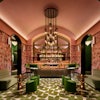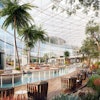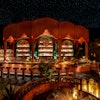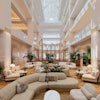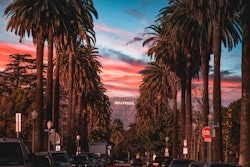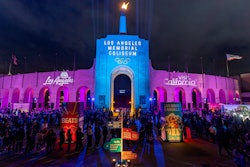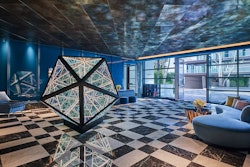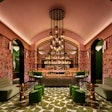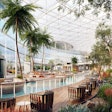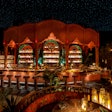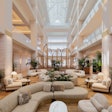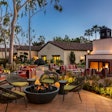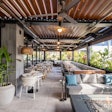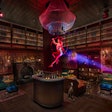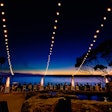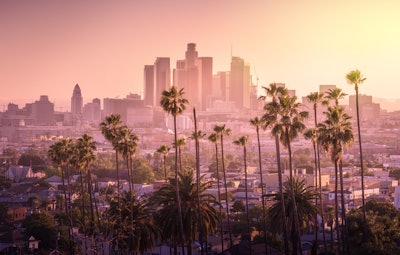
Los Angeles. It’s one of the entertainment capitals of the world, a bustling, diverse, sun-drenched city that’s known for drawing groups that want stylish, state-of-the-art spaces for their meetings and events. It was also the epicenter of this winter’s devastating COVID-19 surge—and while cases are starting to drop, the city is still dealing with some of the tightest regulations in the country.
So it’s certainly encouraging to hear Adam Burke, the new president and CEO of the Los Angeles Tourism & Convention Board, say “I'm really optimistic about what 2021 is going to look like.” That optimism, of course, hasn’t come without a lot of careful planning and hard work.
We caught up with Burke—who took over the role in August—to learn how Los Angeles is preparing for the return of live meetings, what lessons we can glean from events like 9/11 and the Great Recession, and much more.
 Adam Burke, president and CEO of the Los Angeles Tourism & Convention BoardPhoto: Courtesy of LA Tourism
Adam Burke, president and CEO of the Los Angeles Tourism & Convention BoardPhoto: Courtesy of LA Tourism
Burke has worked in travel and tourism for over 30 years, including more than 17 years at Hilton Worldwide. He was previously the COO and CFO for LA Tourism and took over the top spot when Ernest Wooden, Jr., retired this summer. “A couple people have said, ‘So you took this job in the middle of a global pandemic—are you sure about that?’” laughs Burke. “To which my response is, ‘It's actually a great strategy because there's nowhere to go but up.”
While the self-described “pragmatic optimist” has been in the hospitality industry long enough to expect the unexpected, Burke says that “nothing could have prepared us for the magnitude of what we've experienced this year.” But at the same time, he adds, he’s been encouraged by the spirit of collaboration in the industry. “In Los Angeles, for example, the local hotel community downtown has been providing 20,000 meals a week to some of our most at-risk populations. We also have so many hotels that have hosted first responders, relief workers and thousands of members of our homeless communities when needed. The industry has really rallied together, and I think that's what gets us through this.”
He continues, “I always think the glass is half full—but I also think we have a lot to do to fill the other half.” So what is Los Angeles doing to “fill the other half,” so to speak? Burke explains he’s taking a three-pronged approach that’s rooted in lessons he learned during previous downturns.
- Stabilization. “First of all, you have to do what you can not only to make sure your own organization is financially healthy, but to take good care of your team. Something like this takes an emotional and mental toll on people,” Burke notes. “We have to be incredibly attentive to the needs of our teams, and all of us are working with significantly reduced staff right now.” He adds that stabilization is also about looking outside of your organization to ways you can support your local community, something that the Los Angeles team has long been passionate about.
- Preparation. Preparation is the stage Los Angeles is in right now—and Burke is adamant that the notions of health and safety and economic recovery are in no way at odds with each other. “I actually think they go hand in glove. The only way to achieve a sustainable reopening for the group side of the business, and for leisure as well, is to lead with health and safety," he says. "Our goal in Los Angeles has been to be incredibly thoughtful about making sure we're looking at best practices and really partnering with our public health officials.” A big part of that, he adds, is making sure that customers, planners, attendees and employees alike all feel confident in their own safety.
- Recovery. “I will be honest in saying that Los Angeles has definitely been slower to reenter the group market than other destinations,” says Burke. “And that's by design: Our goal is that when we do gradually begin to reopen the meeting sector, that it's for the long term and that we can still execute with the excellence that people have come to expect of LA."
How They're Doing It
Burke called out several key things his team has been working on lately.
- Focusing on technology-based solutions. Los Angeles is investing heavily in hybrid event technology, with venues like the J.W. Marriott LA Live building a fully functioning Virtual Presentation Stage, created by PSAV/Encore. “We are really the entertainment and technology capital, and we already have all of these turnkey production facilities available," says Burke. "Planners can come here with confidence that they can do a hybrid meeting and they can do it seamlessly.”
The team is also leaning heavily on virtual tours and site visits, something the destination led the way on when it developed a virtual tour of the Los Angeles Convention Center in 2015. LA Tourism’s website now offers a full suite of virtual venue tours; the team works directly with each venue to highlight the features that are most important to meeting planners. It's an offering the industry seems to appreciate: The team notes that between March and April of 2020, LA Tourism saw an increase of over 300% in website traffic to the virtual tours. - Being fully transparent in all communications. “One of the things we realized early on is that the key to this is transparency—we’re all trying to figure it out together,” says Burke. That concept has led to a number of transparency-focused initiatives, including a section on the LA Tourism website where venues can link to their own specific health and safety protocols. "The other part of it is creating an expectation for people coming to LA that there's a shared obligation,” he adds. “You'll see that on all of our creative, we've been using the hashtag #TravelResponsibly, because there's a shared responsibility to make sure that we create a safe environment for everybody.”
- Recognizing that health and safety need to come first. In July, the Los Angeles Convention Center became one of the first convention centers on the west coast to receive the Global Biorisk Advisory Council (GBAC) STAR facility accreditation for cleaning, disinfection and infectious disease prevention. What’s more, the Los Angeles International Airport was the first in the U.S. to deploy a large-scale pilot of thermal scanning cameras that could identify travelers with an elevated body temperature. The airport also launched a new onsite COVID-19 screening lab, offering PCR tests for $125; it also recently debuted a new touchless TSA platform.
- Promoting outdoor space. A city with 300 days of sunshine is, of course, well-suited to host outdoor events—and LA Tourism has been quick to emphasize that. “Los Angeles has a unique advantage in that we do have so many unique outdoor spaces—and we've seen clearly from research and direct feedback from customers and planners that they will be much more comfortable using outdoor spaces [when meetings return],” explains Burke.
- Highlighting diversity and inclusion. The pandemic wasn’t the only way the world changed in the last 12 months. This summer’s Black Lives Matter-related protests have certainly drawn an increased focus on how cities are handling issues of diversity and inclusion—and Los Angeles has leaned into it. Burke says, “What we found is, especially over the last several years, one of the reasons why people come to Los Angeles is because it’s one of the most diverse, welcoming and inclusive destinations in the world.” He continues, “In LA we speak over 240 different languages. People worship in over a hundred different ways. We don't have any majority ethnic or racial group. So that's why ‘Everyone is Welcome’ has really been our consumer positioning, and I think you see that in a group experience as well.”
- Educating planners on the importance of DMOs. Burke explains that the pandemic has created a heightened focus in the group sector on the importance of destination marketing organizations. “It's a little bit like drinking from a fire hose in terms of all the information that's out there,” he says, noting that partners, customers and planners need to be incredibly flexible right now with ever-changing restrictions and best practices. "There's been a heightened focus on the DMO as being the central resource for trusted information about opening status, safety protocols and what the delegate experience will be like,” says Burke, adding that DMOs can also help with the complex rebooking process. “If you are the event planner, you've got to work with potentially the convention center, two or three host hotels, a couple of different event venues—any number of organizations. That has given us the opportunity to really partner with them to act as a facilitator. … We want to make sure that we support each other through this.”
- Supporting its members and clients year-round. Burke notes that LA Tourism is a nonprofit organization with over 1,100 members who represent a broad cross-section of the travel and tourism industry, including hotels, event venues and restaurants. “So early last year we suspended membership dues for all of 2020. And while that certainly had a financial impact on us, we knew that that's something we could do to help support our community and our members through this,” he says, adding that when Los Angeles entered another stay-at-home order in December, the team decided to continue suspending member dues through June. “It's things like that that we can do to really be supportive.”
The team has also tried to keep Los Angeles top of mind for its customers by hosting a series of virtual client events on Zoom, ranging from a community yoga session to special musical performances to a cooking class with Wolfgang Puck Catering. Most recently, LA Tourism hosted a virtual event with a mentalist who regularly performs at the Magic Castle; over 50 clients ended up attending. "The reason we're all in this business is because it's about face-to-face connection. The beauty of the meetings industry is that it's not just about the content that happens in session. It's about the unanticipated, organic conversations that happen around the bar, over the dinner table or during breaks,” says Burke, adding that these virtual experiences “really enable us to continue to showcase what is a uniquely LA experience—even while we can't get together in person.”
Hope for the Future
Burke notes that prior to the pandemic, Los Angeles was coming off of nine years of record growth. “In 2019, the meeting sector supported almost 100,000 jobs in LA County and generated almost $16 billion in business sales,” he says. “Obviously, one of the really heartbreaking parts of the last year is we've seen job loss approaching three out of every four in the meeting sector. It's going to take safely and responsibly reopening meetings to get those people back to work. That's our top goal.”
And despite the disruptions, Los Angeles is certainly on the road to recovery, with a number of major hotels slated to open this spring, along with a decade of major sporting events—including the MLS All-Star Game in 2021, the Super Bowl in 2022 and the Summer Olympics in 2028—on the horizon.
“That combination of new product, as well as these major events, is what makes me so bullish on our future,” says Burke.
This story originally appeared on BizBash's parent site, ConnectMeetings.com, here.
